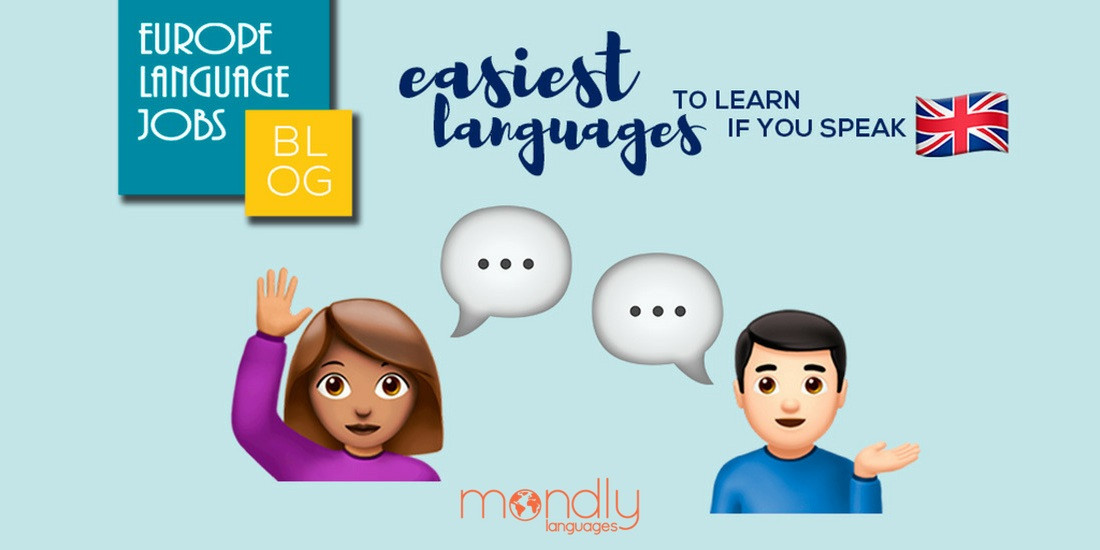People often ask us: What is the easiest European language to learn if you speak English? Well, that's a very good question...
Language learning offers the chance to brighten your world. Along with experiencing the beauty of other cultures and making it easier to communicate with people from around the globe, you’ll also be improving your professional skill set. As the economy continues to move from a local to a global level, being multilingual will become even more of an asset.
Perhaps you don’t have a need to learn any particular language but rather a basic desire to broaden your linguistic horizons. If so, you might be wondering where to begin.
You might choose to learn the language that is most utilized in your field. Another option is going with the easiest language to learn. If your goal is to help spruce up your resume as soon as possible, this is probably the best route to take.
Luckily, three of the most commonly spoken languages around the world are also some of the easiest for English speakers to pick up.
The Familiarity Factor: The Subconscious Aspects of Language Learning
You likely have more exposure to foreign languages than you might realise. Sure, you might not speak Spanish yourself, but how often have you heard it spoken around you in everyday life?
Chances are that you’ve picked up on bits and pieces of foreign languages via:
- Popular songs that often include foreign phrases or are performed in another language altogether
- Popular movies or TV series with subtitles
- Multilingual friends, family, and co-workers who speak other languages in your presence
You might be thinking that you never actually listened to the languages being spoken in any of these circumstances, but the subconscious mind picks up on more than you might expect.
Once you begin learning a new language, you will likely see some words, phrases or sounds that you recognise, and this will help with the learning process and boost your confidence.
The Three Easiest European Languages to Learn for English Speakers:
1. Starting with Spanish
Spanish is the third-most spoken language on Earth, and it is likely to be the foreign language that, as an English speaker, you’re most familiar with.
Learning Spanish is popular in a lot of schools and it’s quite straightforward. Words are generally pronounced the way they are spelled, making it easy to pronounce while reading.
What’s even better is that the Spanish language contains many English cognates, which is one of the reasons why it’s generally one of the easiest languages for English speakers to learn.
Some familiar Spanish-English cognates include:
And if you add the familiarity factor to the mix, you’ll find out that you already know quite a few words in Spanish. The likelihood is that the words: fiesta, siesta, chico, amigo, fajita and casa are all familiar to you.
Even if you’re not a fan, you have probably heard songs from Shakira, Enrique Iglesias or Jennifer Lopez hundreds of times. This has already accustomed you to the Spanish language. Not to mention if you’re a diehard fan of the popular TV series such as Narcos or La casa de papel (Money Heist), filmed entirely or partially in Spanish.
Learning Spanish doesn't have to be seen as something stressful. It all depends on the goals and objectives you set for yourself and method used during the process.
Remember, the key to success is always consistency and positivity. Some days will be harder than always, so make sure to check for resources to assist you with any difficulties. If you don't know where to begin, click here:
2. Getting Great at German
German might not be as familiar to English speakers as Spanish, but it’s still one of the easiest languages to learn for English speakers, mostly due to its similarities to English.
Additionally, just like Spanish, German is also a phonetic language. That makes pronunciation easy to figure out. The spelling rules are a bit more structured, and unlike the English language, which has both simple and continuous present tense, the German language only has one form of the present tense. All of these things can make learning German easier in the beginning.
Moreover, the English language is part of the family of Germanic languages, which also includes German, of course. This means that the languages are somewhat similar in structure and may even contain similar words that are easy to recognise, also known as cognates.
Some examples of German-English congnates include:
In addition to cognates, you probably picked up German words from popular songs and movies. In terms of music, you might have also heard the popular ‘99 Luftballons’ song by Nane or, if you’re a rock fan, Rammstein songs were a big part of your playlist.
When it comes to movies, there are quite a few 100% German movies in IMDB’s top movies of all time. Some of the most popular are 'The Life of Others’ (Das Leben der Anderen) and ‘Downfall’ (Der Untergang). Watching them will unconsciously get you one step closer to learning German.
3. Finding Fluency with French
Knowing English will help you learn Spanish, but knowing both English and Spanish will help you learn French even faster. The more you teach your brain about languages, the more their various structures will begin to make sense to you.
On top of that, English and French have a lot of common ground, and, following the Norman invasion of England in 1066, English and French share many cognates.
The pronunciation of French is actually much easier to understand than English, which contains a variety of words with the same spelling yet completely different meanings or pronunciations.
Many of the French cognates actually have the exact same spelling as the English words. Words like international, distance, and finance are all written the same in French, making it one of the easiest languages to learn for an English speaker.
Some cognates with slightly different spellings include:
Do you notice any patterns with these words? French contains many patterns, and once you begin studying, you’ll quickly start picking upon them.
Also, you were picking up new French words without you even knowing when you were listening to Zaz or Celine Dion and watching ‘Amélie’ or ‘The Intouchables’ (Intouchables).
Pick your language wisely
Learning a new language can seem daunting at first. But if you choose the language you want to learn wisely, it can become one of the best decisions you will ever make. The secret is to start with a language that can offer you great professional opportunities, but also one that’s easier to learn.
While Chinese and Hindi are the languages spoken by the most people on Earth, learning them would be extremely hard and it would take a lot of extra time. As you already know English, you will have an easier time learning Spanish, German, French, or any other European language.
Now is the time to pick the easiest language to learn for you and dive into learning a few new words and phrases every day. The easiest way to start is by downloading one of the better language apps and committing to learning daily until it becomes a habit. Before you know it, you’ll expand your linguistic horizons and improve your employability.
What’s even better is that once you start to approach fluency in one of the above languages, it will be easier to learn a bunch of other languages. Who knows what languages you will speak in the future?
Today's guest post comes from Sebastian Maraloiu, CMO of the language learning app, Mondly.
















Maria Belen Suarez10mo ago
It makes sense, my native language is Spanish and I'm familiar with English since I'm a child, I know that I have facility to learn and understand a new language. But sometimes I feel like I'm not prepare to speak a foreing language as Italian (I'm living in Italy right now) even when I understand and write well, I feel blocked when I have to speak it. To anyone happen the same?
It makes sense, my native language is Spanish and I'm familiar with English since I'm a child, I know that I have facility to learn and understand a new language. But sometimes I feel like I'm not prepare to speak a foreing language as Italian (I'm living in Italy right now) even when I understand and write well, I feel blocked when I have to speak it. To anyone happen the same?